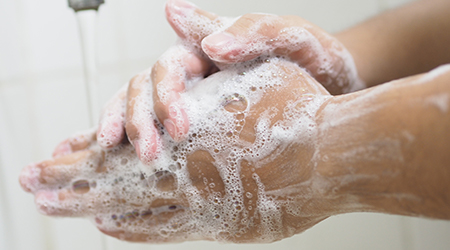
As the national debate over the benefit of masks in the COVID-19 age rages on, one interview with an emergency room medical doctor caught the attention of the head of the Handwashing Leadership Forum.
The doctor’s response in the interview should pique the interest of janitorial and cleaning managers in commercial and healthcare facilities, school districts and universities across the country. The interview focused on the safety of frontline medical workers during the pandemic. The subject was working conditions in the New York borough of Brooklyn, one of the country’s earliest COVID-19 hotspots.
“Even in an area with high incidents, the doctor said, ‘I’m safe, because I’m washing my hands,’” says Jim Mann, the Forum’s executive director. “He didn’t even mention masks and he’s a doctor in a high-risk situation. There’s more control than people think with handwashing.”
Most of the national focus about staying safe from the COVID-19 pandemic emphasizes that people should wear a mask, practice social distancing or both. These steps are important prevention methods, but they should not push the benefits of handwashing to the backseat in that discussion. Cleaning managers are advised to treat handwashing as equally important.
“The best advice your mother ever gave you was to wash your hands, because she understood that’s how things get spread around,” says Darrel Hicks, author of Infection Prevention for Dummies. “People say, ‘We’re out of sanitizer, what are we going to do?’ I say, wash your hands, and do it for 20 seconds.”
Talking Handwashing
Handwashing may not raise the passions of Americans like the wearing of masks, but it remains a reliable source of infection prevention. The Centers For Disease Control and Prevention (CDC) lists handwashing as an “important part of the U.S. response to the international emergence of COVID-19,” says Helen Larios, project director-clinical, for the Department of Standards and Survey Methods Division of Healthcare Quality Evaluation for The Joint Commission, Oakbrook Terrace, Illinois.
“Clean hands are the single-most important factor in preventing the spread of pathogens and antibiotic resistance in healthcare settings,” she says. “Hand hygiene reduces the incidence of healthcare associated infections.”
As commercial and public buildings begin to reopen and businesses try to return to normal, janitorial and facility cleaning managers are trying to manage the process of keeping their buildings safe for occupants. One of the nods to the COVID-19 era inside public buildings is the increased presence of hand sanitizing stations in high-traffic areas, such as building entrances.
Ensuring that all employees and the public feel comfortable with the cleanliness of the building should be the goal of every facility cleaning manager.
“A lot of the messaging is communication, assuring that it is an absolute priority for customers and clients, that hand hygiene and cleaning practices are front and center,” says Brian Sansoni, senior vice president, communications for outreach and membership at the American Cleaning Institute, Washington, D.C. “It may seem simple, but you can’t take it for granted. Depending on the type of business you have, or the office building or workplace layout, consider having handwashing stations available or hand sanitizer stations available throughout your facility.”
He adds, “Consider where you have the most foot traffic. That’s where you want to have the hand sanitizer dispensers available so when people enter the building, where they didn’t have them (pre-COVID-19), they do now.”
Another subtle way to keep proper hand hygiene top of mind for building occupants is to post reminder messages throughout the facilities.
“I can see managers coming up with their own individual signage,” says Mann. “How do you get the message to the people coming into the building every day? It’s tough. That message could go with the hand sanitizers. Focus on that and put out the message, and set the theme for going into the building. It says we care and you need to do your part.”
Restrooms are a clear source for spreading germs and a potential danger zone for the spread of COVID-19. One of the special precautions that managers must make is to ensure that dispensers never run out of soap.
“Check a couple of times a day that the soap dispensers are filled,” says Sansoni. “Empty dispensers send the wrong message to employees, customers and clients. Make sure they’re in good working order.”
Facilities To Adopt Touchless Products

 The Down and Dirty on Cleaning in Virus Season
The Down and Dirty on Cleaning in Virus Season How Surfactant Use is Expanding in Commercial Cleaning
How Surfactant Use is Expanding in Commercial Cleaning Operational Excellence Series 2025: Better Budgeting
Operational Excellence Series 2025: Better Budgeting